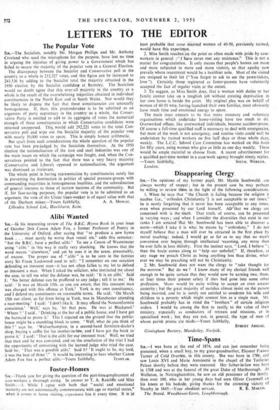Foster-Homes
Sta,—Thank you for giving the question of the part-timesemployment of case-workers a thorough airing. In answer to T. A. Ratcliffe and Miss Smith:-1. While I agree with both that "social and emotional maturity are not automatically commensurate with age or marital status," when it comes to home visiting, experience has it every time. It is- al
least probable that some married women of 40-50, previously trained, would have this experience.
2. Miss Smith touches-on the point so often made with pride by case- workers in general :"I have never met any resistance." This is not a matter for congratulation. It only means that people's homes are more and more subjected to more and more visitors, so that apathy now prevails where resentment would be a healthier male. Most of the visited are resigned to their lot (" You forgot to ask to see the pawn-tickets, love "). Certainly those registered as foster-parents have voluntarily accepted the fact of regular visits at the outset, 3. To suggest, as Misi. Smith does, that a woman with duties to her family cannot take on a toughish job without creating deprivation in her own home is beside the point. My original plea was on behalf of women of 40-50 whe, having launched their own families, must obviously have much time and emotional energy to spare.
The main issue appears to be that many statutory and voluntary organisations which undertake home-visiting have too much to do. Overworked offices, like overworked individuals, become accident-prone. Of course a full-time qualified staff is necessary to deal with emergencies, but most of the work is not emergency, and routine visits could well be undertaken by trained workers on five half days or three whole days, weekly. The L.C.C. School Care Committee has worked on this basis for fifty years, using women who give as little as one day weekly. There would be ample material to choose from. A recent advertisement for a qualified part-time worker in a case-work agency brought ninety replies.


































 Previous page
Previous page